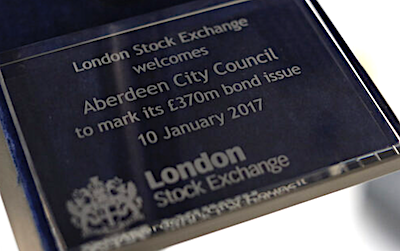Moody’s Ratings said it has completed a periodic review of the ratings of Aberdeen City Council “and other ratings that are associated with this issuer.”
Moody’s said: “Aberdeen’s ratings, including its baa1 baseline credit assessment and its A2 issuer and senior unsecured ratings with a stable outlook, are unchanged.”
Aberdeen City Council completed a £370 million bond sale via the London Stock Exchange in 2017 in a first for a Scottish council.
“This publication does not announce a credit rating action and is not an indication of whether or not a credit rating action is likely in the near future …” said Moody’s.
“The ratings and outlook are supported by Aberdeen’s track record of solid operating performance and strong internal governance and scrutiny although financial performance has weakened due to pressures from inflation and rising demand for services.
“Aberdeen benefits from the supportive institutional framework for Scottish local authorities. Reserve buffers are low at 13% of operating revenue in fiscal 2024 but this is in line with the rest of Scotland where reserves tend to be lower given the more generous grant regime.
“The ratings are constrained by Aberdeen’s relatively high debt level of 139% of operating revenue as of fiscal 2024, which is forecast to increase further to fund its capital programme.
“Recent large capital projects have increased Aberdeen’s exposure to commercial risks, demonstrating the council’s higher risk appetite than peers.
“Although income levels are higher than in the rest of the UK, Aberdeen’s economy is highly concentrated in the oil and gas sector, which results in volatile growth and exposes the local economy to carbon transition risks.
“Aberdeen’s ratings also incorporate our view that there is a high likelihood that the UK government would act in a timely manner to prevent a default.
“This document summarizes our view as of the publication date and will not be updated until the next periodic review announcement, which will incorporate material changes in credit circumstances (if any) during the intervening period.”
